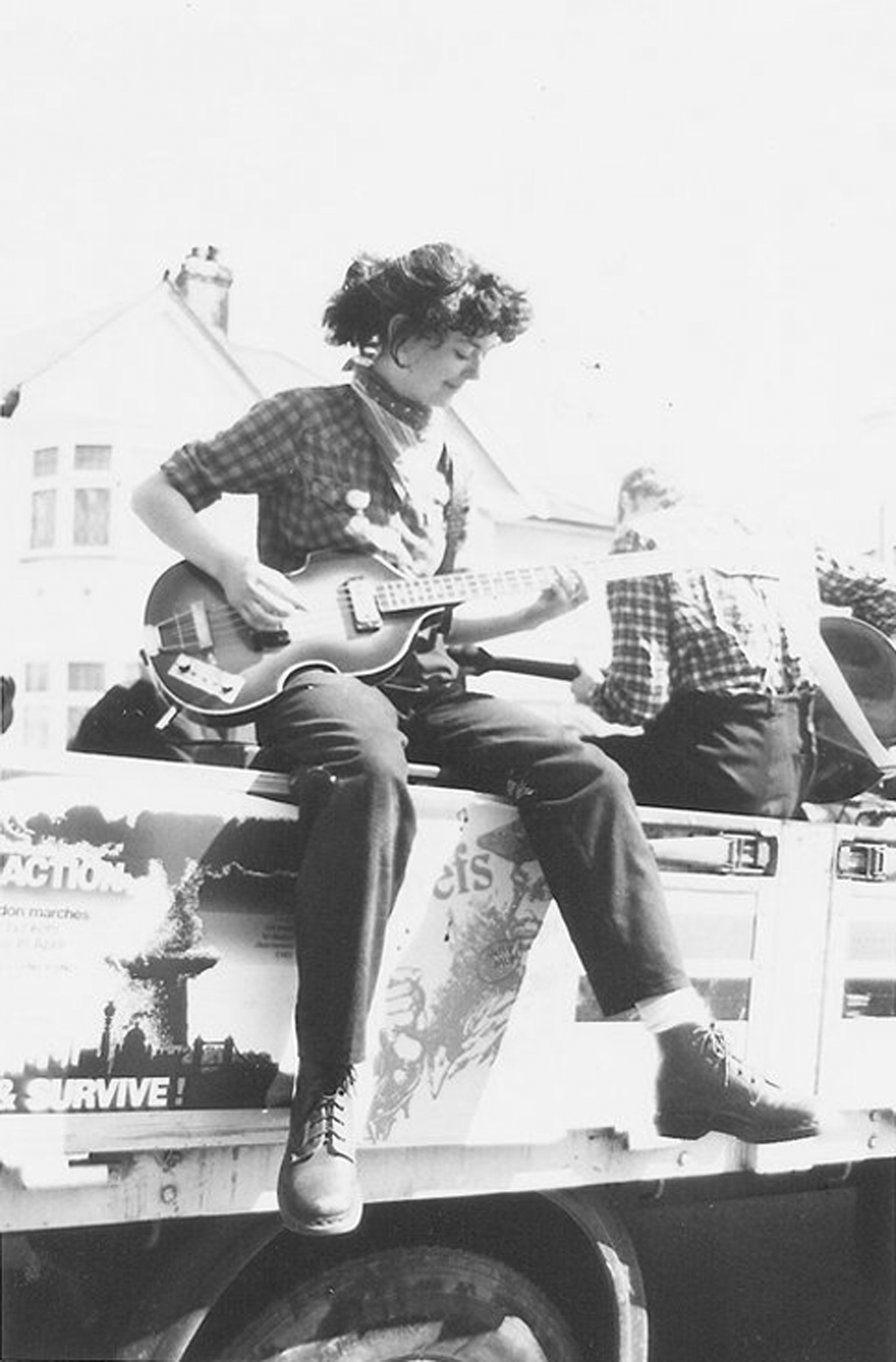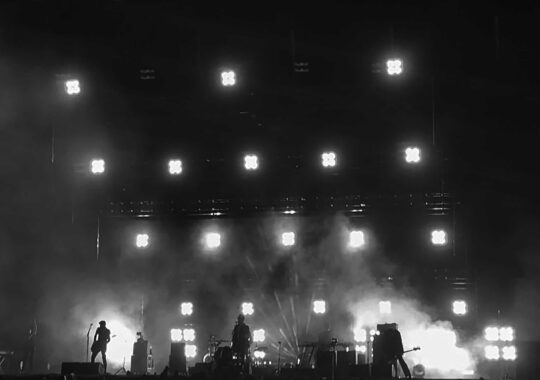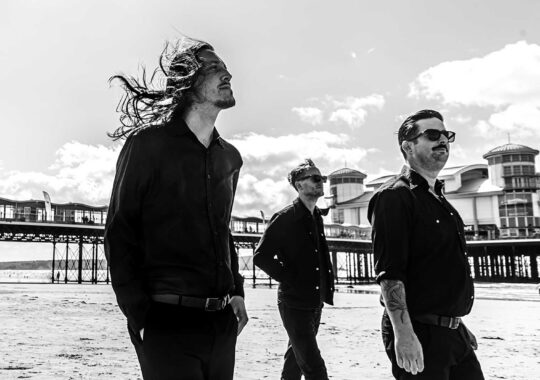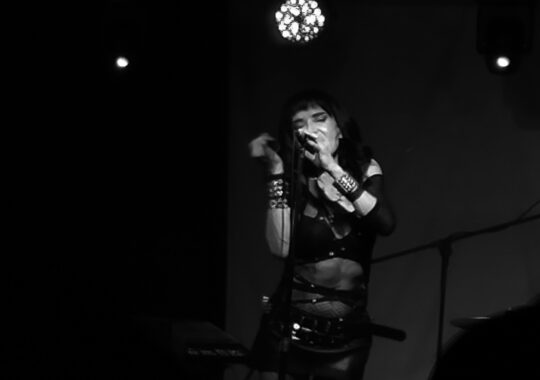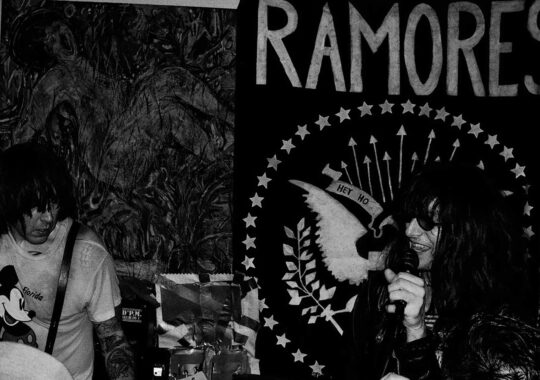The Chefs, March 1981. Pete Chrisp
Helen McCallum started playing music in 1977 as part of Brighton’s music scene. At the same time punk was exploiting the UK she decided to grab her bass and joins Joby and The Hooligans. She will also be part of bands such as The Chefs, Skat, Helen and The Horns and The She Punks. With all of her bands and collaborations as Helen McCallum or Helen McCookerybook there’s no doubt about her legacy in music. We can also enjoy her work not only in music but also in films and writings. During this interview we were able to feel her heart, soul and dedication. From us to you with love one of the legends and goddesses of punk and british indie pop.
Lee la entrevista en español aquí
By Píntalo de Negro
-Who is Helen McCallum?
Helen McCallum is the name I was born with. My Dad was Scottish, and my Mum was Scottish/American.
-How do you come up with the idea of changing your last name?
Almost everyone who joined a punk band, made clothes or made fanzines changed their name. It was a way of starting again, part of making our own rules about who we were and what we wanted to do. There was a strong feeling of expectation from the older generation that we would conform and build on what they had created. But their values were old-fashioned and we didn’t have jobs or money like they had: we needed to disconnect from them and start again. Family names are a form of ‘branding’, and we wanted to reinvent ourselves.
-Tell us about your days playing with Joby and The Hooligans, did you learn to play the bass with them?
I lived in a big squat in Brighton; there were always between 16-20 people living there. A very noisy punk band constantly rehearsed in the basement. Me and some friends got them a gig to try to get an evening of peace, but they wouldn’t do it. So we formed a band: my boyfriend, two other boys and me. They wanted to do the ‘rock star’ jobs: lead singer, guitars. They told me I should be the bass player because that would be easy! One of them tried to tell me what to play, but I realised that I had listened to the bass in every record I heard, and I naturally knew what then bass guitar should do in a song. So I learned ‘on the job’!
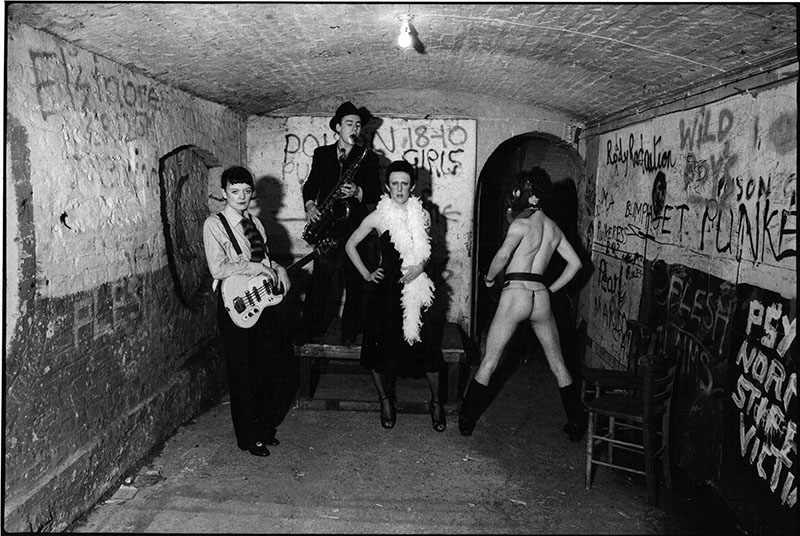
-Which artists influenced you for taking such a leap into music?
I remember seeing Suzi Quatro on BBC’s Top of the Pops show, rocking out with her bass. I started in 1977 and a lot of the punk bands were just starting up, so I wasn’t even really aware of The Slits although I soon came to really admire them, and Tina Weymouth, and later the Raincoats, the Au Pairs and the Mo-Dettes. I also saw Girlschool on TV and loved the way they just got on with playing, looking entirely normal. I think the main thing was just the excitement. I had been so quiet at school, there were a lot of bullies, and home was very strict. Because there were such a lot of us doing it, nobody even thought of being worried about being on stage playing music. It just seemed normal, natural and really empowering to be able to shout and make a noise.
-Can you share with us some of your memories about the Brighton’s music scene in the late seventies and early eighties with bands such as Wreckless Eric.
Brighton was really busy. Nobody had any money so you’d have to try to talk your way into gigs. Often, I used to work on the door at a venue called The Alhambra which had bands on every night. There was a music scene in Brighton before punk: folk, blues, heavy metal and reggae, so the venues were there. There was a big divide between the successful bands who had record deals, and the everyday bands who had started up because of punk. Joby and the Hooligans supported Johnny Thunders and the Heartbreakers at Sussex University once, but we were so drunk they pulled out the plugs, and stopped us soon after we started! The most famous band in Brighton at the time were called the Piranhas, and they were a big influence on Madness. I remember seeing Wreckless Eric, the Au Pairs (supported them!), The Pretenders, The Damned, the Mekons, The Ramones and lots of other bands. Life was just about music and politics, and eating chips!
-Do you think the conditions for women wanting to make music had change?
Yes, a lot. I don’t think I would become a musician these days; there is much more emphasis on being a good instrumentalist and performer now than there was back then. What we did was really spontaneous. There is no film, and very few photographs; mostly it lives in people’s memories. If you haven’t been brought up to be an excellent musician from childhood, you need somewhere to begin. Now, everything is documented and people have to be much more careful about what they say and do so they don’t get criticised. It looks as though there are more opportunities, but those opportunities are often really controlled by fear of failure, and audience expectations of high standards. I salute grass roots organisations that support women’s music making, like Loud Women.
-Before C86 The Chefs where already composing, playing and recording, Do you feel you shared scene with them or you identified more with punk scene?
By the time The Chefs got started, punk had moved off in another direction. I felt as though it had been invaded by strict ideas about what it should be, and there didn’t seem to be a place there for me any more. C86 is something that was named afterwards; mostly, The Chefs belonged to the Brighton music scene. It became more difficult when we moved to London, because we were much more isolated. We always wanted to concentrate on songwriting, making our songs as complete as we could, and we learned a lot musically from each other. I was surprised to be in a band that was not just about making a noise, and even more surprised to discover that I began to play and think as a musician rather than an angry young woman. When the Postcard records bands started up- Orange Juice, Aztec Camera and so on, I could see a connection with what we were doing there. I think a lot of young bands suddenly discovered that they could write songs. the punk movement had been a trailblazer in terms of independence in the music industry, and the space was there to make the music. At the end of the 1970s and beginning of the 1980s, independent music really started to thrive in the UK. It’s so energising!
-At the beginning of your career which difficulties do you remember overcoming?
Violence, people trying to control what I did (it was a very sexist time). I was physically attacked a few times. Everyone seemed to hate punks, and we hated them back. Also being in a band is difficult! You have a lot of arguments about music, and being together all the time, travelling and rehearsing constantly is really intense. You are under a spotlight: people try to manipulate you, get jealous, expect things from you you can’t deliver. But that’s the price of independence and I always new that.
-Nowadays you are a huge punk legend and a very respected academic, Are things easier now?
Ha ha! No, because I find it hard to do things that I disagree with. I have always been independently spirited and that sometimes causes conflict. It is nice that people are interested in what I do and what I have to say though- thank you for inviting me to speak to you!
-Can you share with us the story behind The Chefs name?
When I was at art college I made a book called The Handbook of Suburban Styles, and there was an illustration of a dancing chef with a poem called ‘Food’. When Carl, our guitarist, came round to ask me to be in a band with him, I was really surprised that he thought I was a good enough musician to collaborate with. He had written music to that song, and he played it to me. That was our first song, and that’s why we became The Chefs.
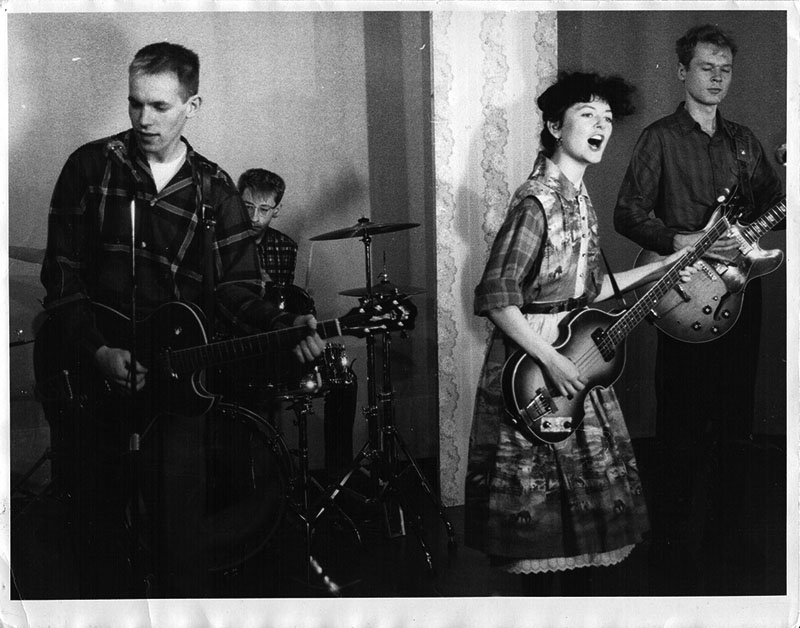
-Can you share with us how was it that you got to play with John Peel, can you share something about those sessions.
I used to write letters to John Peel all the time about my bands. I worked in a shop and was sitting at the till all day long. Eventually, I got bored with writing to him and stopped. Then he announced on his programme ‘I used to get letters from someone called Helen McCookerybook, but she has stopped writing to me. I wonder why?’. So I started again, and kept on until we made our first Chefs EP on Attrix records, the local Brighton label. It was really thrilling to record our first session. We did the first one at their old building in central London with an engineer called Mike Robinson. He was mad, a really big personality. At one point in the session he decided he needed new speakers, and turn the volume ups high on the mixing desk that the speakers just burst!
-‘Femme Fatale’ is great! Why covering The Velvet Underground?
Thats as the one band that all of The Chefs really loved- other than that we had completely different taste in music.
–Records and Tea was released 8 years ago, Are you planning on going back to the studio with The Chefs any time soon?
No- the future is better than the past.
-Do you still keep in touch with the members of The Chefs and The Skat, What have been of them?
One fo them is my brother, so yes! I’m not in touch with Carl any more, and sadly our drummer Russell died a few years ago.
-Vic Godard & Subway Sect are contemporary with The Chefs, How was it working with Vic Godard two years ago with ‘Autumn Rendez-Vous’?
It was really good fun. Being invited to collaborate with other musicians is the best thing about it all really!
-When did you started writing Lost Women of Rock Music: Female Musicians of the Punk Era? What was happening to you back then?
I had been studying for an MA and discovered that there were no books about women punks in the library- I found that so disappointing. I tried for ten years to do a PhD, but that’s really expensive. Eventually I ended up lecturing at the University of Westminster and asked if I could do it there alongside teaching. I was a mother of two daughters back then, very busy, but i was very motivated. A bit like punk- I was angry that nobody had noticed how many women were in bands, and it had bene turned into a male subculture like all the others. The PhD because a book. I am Dr Punk!
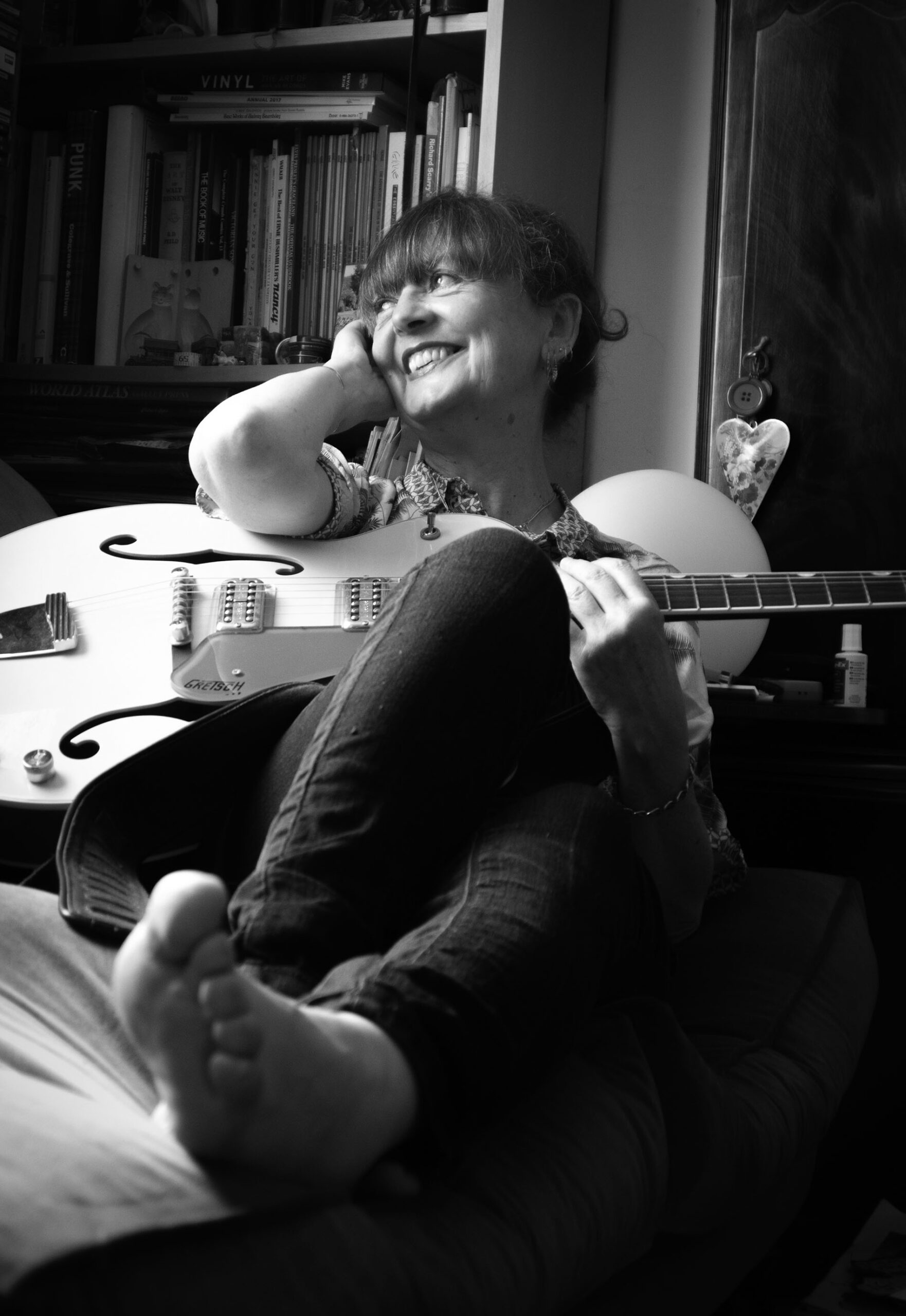
–Stories from the She-Punk idea comes from that book, Why making a movie? Can you share with us details about the filming?
It was Gina’s idea to do the film. I knew the Popular Music curator at the British Library in Londonfrom going to gigs in the 1980s and I said ‘Let’s ask if we can show the film there’ before we had even filmed anything. We didn’t realise but the next year (2016) was the anniversary of punk and they were planning a big event, so we were the first thing he booked, even though we hadn’t even started yet! So we had to hurry up and contact people- everyone said yes, and doing those interviews was one of the best things I’ve ever experienced. Everyone was so funny and strong. Lots of things went wrong- broken cameras, no money, my car broke down on the way back from interviewing Jane Munro, the bass player from the Au Pairs in Birmingham. All a bit like punk itself.
-Gina Birch is another legend, How was it working with her? Do you keep a close relationship with her?
Gina is great- we became really close after I interviewed her for the book and we have done a lot together- toured together, made music, made the film, know each other’s families, and been through some difficult life things together too. she is now mostly an artist, a painter, and I don’t see so much of her because it’s a different work, but we will always be friends.
-Do you had difficulties while shooting?
Too many to mention!
-This film rescues and recognizes a lot of unspoken or lost histories , which one of this testimonies holds a special place for you?
All of them in their own way; it was a pity not to be able to use a lot of what we filmed because we had to make a narrative and we did it all in our own time, in between life, being a mum, working and so on. You feel like you know the people very well after so much logging the different scenes and so on. I felt really proud to have been able to speak to them, the ones who are not so famous as well as the ones who are. It made me realise just how interesting human beings, and especially women, are.
-You were part of the 70´s punk scene and now you are the one doing the questions, how is it to be the one doing the questions?
It’s a different experience! I have to explore my own brain instead of exploring other people’s.
-Any plans for doing more music in the future we should get excited about?
I have my label and I record and release music on that regularly. It’s here: https://helenmccookerybook.bandcamp.com/
I play live a lot nd go on tour around the UK and sometime sin Europe, although like every other live musician I’m doing online shows at the moment.
-Do you like any actual punk band? What have you been listening to lately?
Kleenex! I love them. And Big Joanie.
-Finally, as a very special gift for our readers share with us your top 10 punk albums interpreted by women.
That’s too hard! Anything recorded by The Slits, the Raincoats, Kleenex, Bjork, Tom Tom Club, B52s, Carmel, and so on. But mostly- punk is best live! PÍNTALODENEGRO

